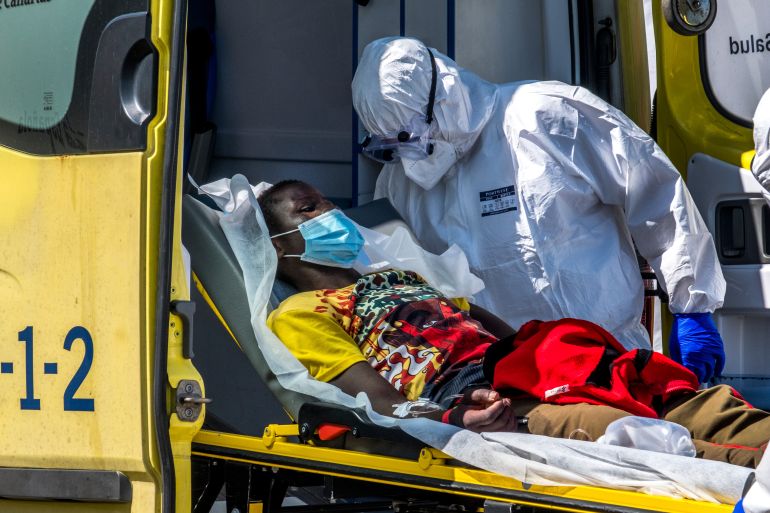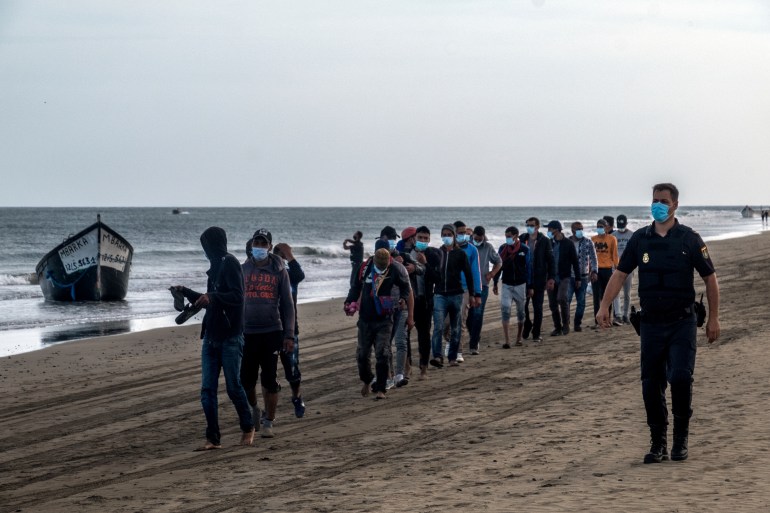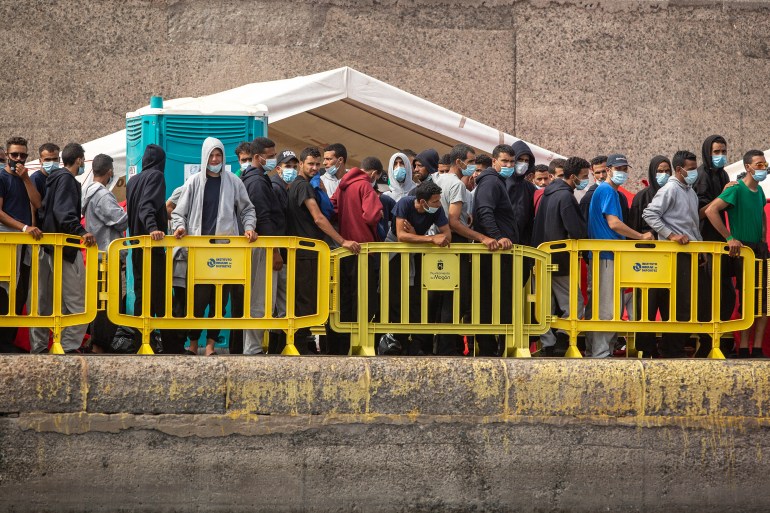Refugee crisis brews on Canary Islands with record arrivals
As hundreds from West Africa risk lives to reach Spain, the far right is capitalising on locals’ fears amid pandemic-related economic woes.

Madrid, Spain – The body of an unknown man was among nearly 2,200 refugees and migrants who landed in the Canary Islands at the weekend, a new record in arrivals as Spain struggles to control a fresh migration crisis on Europe’s southernmost frontier.
Refugee agencies fear a humanitarian crisis could happen in the archipelago as there is nowhere to house the huge surge in arrivals from West Africa.
Keep reading
list of 4 itemsCyprus suspends asylum applications for Syrians as arrivals rise
Agadez, Niger’s gateway to the Sahara, finds new life in the migrant trade
Forced from home, these Colombians struggle to live in a basketball stadium
More than 1,500 people are sleeping in tents on the Arguineguin dock in Mogán, a town in Gran Canaria usually popular with tourists enjoying the winter sunshine.
About 5,000 more are being housed in empty hotels as the islands’ tourist season has ground to a halt because of the COVID-19 pandemic.
Aid agencies claim without rapid action from the Spanish government, the situation could mirror the fraught refugee crisis in Greece.

With the Spanish economy battered by COVID-19, some angry islanders resent the presence of thousands of refugees and migrants housed in hotels at a cost to the taxpayer, providing fertile ground for the far-right Vox party to exploit the issue.
The influx of people from West Africa recalls an earlier crisis in 2006 when 30,000 migrants made the dangerous Atlantic crossing to the islands.
Maria Greco, of the refugee rights group Entre Mares (Between Seas), says Spain has learned nothing from the first crisis.
“What we are seeing now is intolerable. We have had 14 years to learn from our lessons of the last migration crisis in 2006 and we have failed,” she told Al Jazeera.
“Hundreds of people are sleeping rough in the Arguineguin dock in Mogán. Thousands more are living in tourist hotels. Yet in November 2018, the European Union migration force Frontex held a conference in the Canary Islands and warned that traffickers had changed routes but nothing was done.”
Greco says living conditions in the Canary Islands will soon resemble the worst and overcrowded Greek refugee camps unless urgent action is taken.
“These people are being denied rights to see lawyers and the press have complained that the Red Cross are not letting journalists talk to them,” she claimed.

So far this year, there has been a 664 percent rise in refugees and migrants landing in the Canary Islands compared with the same period in 2019, with 11,409 reaching the seven islands up until November 1, according to the Spanish government’s figures.
Smugglers have switched routes, moving along the more dangerous route between western Africa to Spain’s archipelago instead of across the Mediterranean to southern Spain.
There has been a 27.8 percent decrease in the number of people crossing the Mediterranean to Spain this year compared with the same period in 2019, with 14,252 arriving in Europe compared with 19,733 last year.
Traffickers have lowered their prices from around $2,377 to about $951, according to media reports.
Greco said the boats depart not only from Morocco and Mauritania, the two nations closest to the archipelago, but also from Senegal and Gambia, more than 1,000 kilometres (600 miles) further south.
Most attempting the crossing come from Africa’s Sahel region and Western Africa, she added.
But some arrivals have originated from as far away as South Sudan and the Comoros Islands in the Indian Ocean.
“This weekend at least 2,188 people arrived in the islands in 58 small boats and kayaks. It is a new record which we have not seen before,” Txema Santana, of the Spanish Commission for Refugee Aid (CEAR), told Al Jazeera.
Santana said smugglers changed routes after the EU paid Morocco $460m to support reforms including border management – shorthand for aid for clamping down on departures.
Morocco started to move refugees and migrants away from its north shore and they headed towards the southern and western coast, starting the surge towards the Canary Islands.
But the new pattern has prompted a backlash from some islanders who are struggling to cope with the effect of the COVID-19 pandemic.
Vox, the far-right Spanish party which is the third-largest in the Spanish parliament with 52 legislators, has criticised Spain’s government for imposing restrictions on the population to curb COVID-19, but allowing refugees and migrants to arrive freely.
Alberto Rodriguez Almeida, the Vox member of Parliament for Las Palmas in the Canary Islands, took part in a demonstration last month in Mogán against the “illegal immigrants”.
“We do not want the islands becoming the new Lampedusa. We should expel the illegal immigrants,” he told Al Jazeera.
Socialists run Spain’s national government in Madrid and the regional administration the Canary Islands, but the migration issue has put them at loggerheads.
Angel Victor Torres, president of the Canary Islands government, on Monday, called for an urgent response to the latest arrivals.
Highlighting the concern in Brussels over the latest surge on the borders of Europe, Ylva Johansson, the EU internal affairs commissioner visited the islands last Friday with the Spanish interior minister Fernando Grande-Marlaska.
“The substantial increase in migratory pressure through the Atlantic route to the Canary Islands constitutes a European challenge which needs European solidarity,” Johansson told a news conference.
Grande-Marlaska promised to rehouse the hundreds sleeping on the port of Arguineguin in Mogan in the next few weeks.
“Our objective is to guarantee the dignity of the migrants as a first priority,” he said.
A Spanish government spokeswoman said when they came to power in January, there were only 100 emergency places for migrants in the Canary Islands but now there are about 4,000 and said more would be opened.
She denied refugees and migrants were denied the right to see lawyers or speak freely to the media.
Inevitably, some have paid the ultimate price to try to start a new life in Europe.
Last month, at least 140 migrants bound for Europe via the Canary Islands drowned after a boat carrying about 200 people sank off the coast of Senegal.
The boat caught fire and capsized shortly after leaving the town of Mbour, the International Organization for Migration (IOM) said. About 600 people were rescued, according to reports.
At least 414 people are known to have died along this route so far this year according to the IOM. A total of 210 deaths were recorded in the whole of 2019.